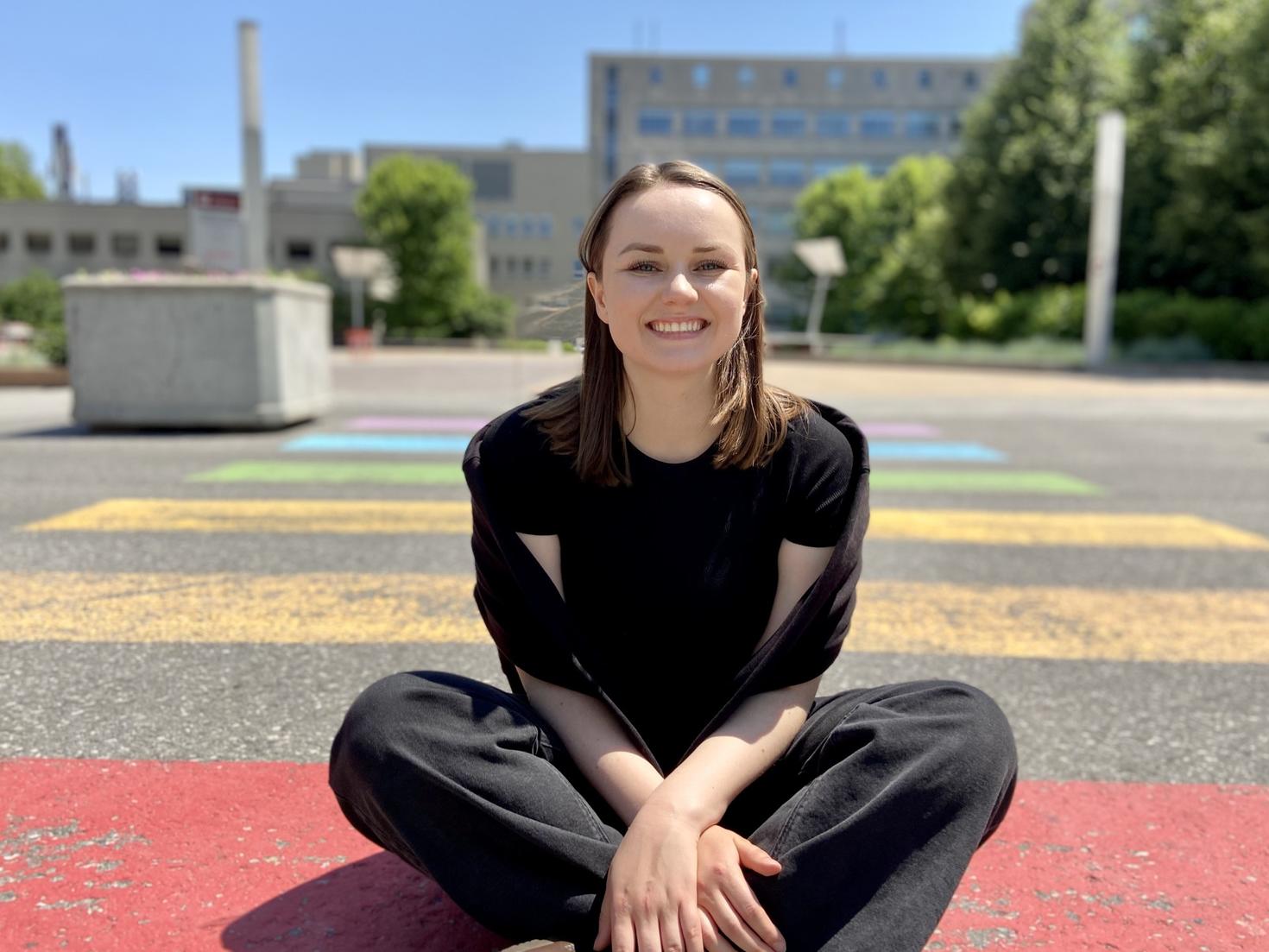Now, as a doctoral student, she’s focused on research in support of those who are exposed to aggression and struggle with mental health challenges, especially 2SLGBTQI+ youth.
Our interview with Hobson is part of the Scholars in Education series.
Tell us about your background and what led you to graduate studies.
My name is Sarah, and I go by the pronouns she/her. I’ve been working with Dr. Tracy Vaillancourt for three years as a master’s student in the Faculty of Education's counselling psychology program. I’ll continue my research with her and the rest of the team from the Brain and Behaviour lab this fall, pursuing my MA/PhD in experimental psychology in the School of Psychology. I’m interested in youth violence/aggression, 2SLGBTQI+ mental health, and the experiences of people with overlapping social identities (such as race and ethnicity, or ability). I’ve been a research assistant in the lab for more than two years (over 1000 hours!) and now I primarily work on the Health and Peer Relations Study (HPRS), an ongoing, seven-year, large-scale longitudinal survey tracking students’ peer relationships and mental health. I’m also a registered psychotherapist (qualifying) with two years of experience as a volunteer and intern directly supporting the mental health of people in Ottawa, including those from 2SLGBTQI+ communities. My goal is to become a practitioner, researcher, and educator while continuing to learn about, advocate for, and support community mental health through prevention and intervention efforts.
What’s the focus of your doctoral work?
I know it will involve gender and sexually diverse populations, but I have many research ideas that I’d like to explore during my PhD, so it’s still evolving. For now, I’m leaning towards examining the characteristics and mental health outcomes associated with having been bullied among 2SLGBTQI+ youth, particularly intersectional differences for those in gender and sexually diverse communities. This information would help better prevent and intervene when it comes to youth violence and mental health. Ideally, I would also like to investigate how we measure this and analyze trends over time.
What inspired you to do this research?
I once had an undergraduate professor who described mental health work as social justice work. It was a sentiment that solidified this trajectory for me. 2SLGBTQI+ issues have always been dear to me for personal reasons, and I’ve witnessed homophobic bullying and related discriminatory behaviour throughout my life. I’ve decided to dedicate my professional career to listening to and amplifying the voices of members of these communities, whether through academic or clinical work, so that I can do my part to better support these youth.
Who might benefit from your findings?
I hope my work will raise awareness about the lived experiences of gender and sexually diverse youth and that it will be useful for preventing and intervening in situations of violence, and supporting the mental health of members of these communities. In my studies and research, I try to be mindful and lead with a strong desire to do justice and do good by and for these young people. I’m always working to be not only an ally, but a good ally.
I aim for my research to be informative for everyone, including those who are not 2SLGBTQI+ by helping them reflect on and understand the experiences of people in communities with which they might not be familiar, or have assumptions about. In this context, I’d like to encourage learning moments that go beyond pointing out that a particular comment or action is wrong and work towards giving hope, time, and support for people to be and do better. I think approaches like this are needed more than ever in our current climate, particularly given the rising levels of hate and violence directed towards gender-diverse peoples.
Have any surprises emerged along the way?
What was most surprising to me so far is a finding that emerged during my master’s research. I found that mental health problems didn’t differ based on whether youth had been bullied, their gender identity, or their sexual orientation. Although sexually diverse groups tended to have more emotional problems compared to straight youth, they did not differ from each other when it came to these mental health concerns. This discovery was surprising given previous studies that found intersectional differences and differences between groups. I also would’ve thought that bisexual youth might experience more bullying, since they often report discrimination in general society and in 2SLGBTQI+ spaces, so it was interesting when this didn’t happen. I think my lack of findings likely stem from not having a large enough sample. However, for the lack of differences among sexually diverse youth, this might speak to how, right now, sexually diverse youth may be exposed to similar general stressors (i.e., stigma, discrimination). My research will look into this in more detail, given that my sample size will be considerably larger.
Why uOttawa?
I had an incredible experience as a student during my counselling psychology master’s degree at uOttawa, surrounded by supportive peers, lab mates, mentors, and professors. I grew so much during this time; it was truly transformative, made possible by the extraordinary people around me. I feel honoured to learn under Dr. Vaillancourt, who promotes a positive, productive environment and fully supports my goals as I continue to be a part of the lab through this next stage of my academic journey. The values of equity, diversity, and inclusion, and the social psychology and advanced quantitative research design and statistics courses offered by the University of Ottawa’s Experimental Psychology program will surely help me achieve my goals.


